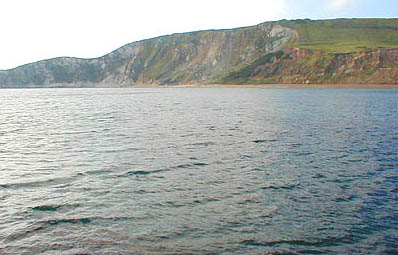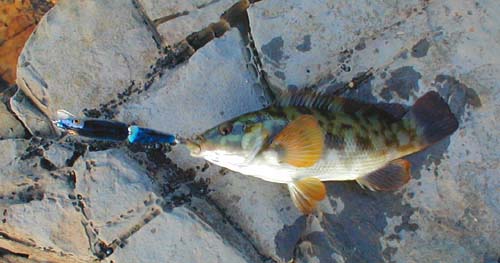
Tackle and Tactics
Mike Ladle
Information Page.
It looks good and it tastes good.
Following the comments about baits in piece 92 I dug out this article which I wrote in 1988. It says a bit more about baits and their effectiveness so I thought it might be worth another read. Here goes!
As mid-winter approaches, my thoughts turn to bottom fishing. But what is bottom fishing? A recent incident made me consider just what it means to other sea anglers and, more importantly, just what is it that governs what you will catch when you try it. For certain the thing to which most attention is paid tackle and rigs is of fairly minor importance!
The whole business was brought in to focus by a meeting on the beach. Fishing partner, Harry Casey, and I were doing a spot of spinning along the curving shingle of Worbarrow Bay, where a couple of days before, Harry had tried the same tactics and, after landing a modest mackerel, he cast again, only for his large Rebel plug to be grabbed by an exceptional fish. In the course of the next twenty minutes the fish never showed itself though on several occasions it took off 50 or 60 yards of 12lb line against heavy pressure. To cut a long story short the fish eventually escaped, still unseen, but it was sufficient incentive for us to have another go.
Conditions were not good for spinning. The sea was grey and rough under the lash of a strong onshore wind, which flung my heavy ‘Toby’ back in my face.
As we worked our way along the beach we passed several anglers using conventional beach casting gear. As things turned out neither tactic produced more than the odd tiny wrasse or pollack but as I approached the far end of the shingle beach, I met two anglers who had obviously been fishing for some time. I paused for a word. One of the two struck and reeled in a small wrasse, which he then returned. We exchanged the usual pleasantries and I asked whether they knew the beach well. (It turned out they had fished that particular stretch, on and off, for about six years) and further questions revealed that, despite their efforts and the fact that they had often made good bags of wrasse, pollack, flatfish or pouting they had never landed a bass or a conger, both of which are common at times.
Further cross-examinations established that the anglers thought that ragworm, which they were both using, was by far the best all round bait.
Of course, one of the main problems in sea angling is collecting enough data to be sure that a bait or method does, or does not, work. Now, for me at least, six year’s catches is pretty good evidence of what is likely to take ragworm from that particular beach.
My own records show one or two small bass and even a few tiny (one to three pound) conger which took our ragworm baited hooks over the past 20 -odd years, with catches of bass, huss and big conger on squid, sandeel, mackerel, pouting and other fish-baits being more frequent.
Worms, it seems, were only good for catching a multitude of wrasse, pouting, poor cod, sole, plaice and mini-pollack. Undoubtedly, if you are prepared to wait long enough than, sooner or later, something unusual or unexpected may take your bait but, for certain, 99 bites out of every 100 will produce the same small fish as the previous 99.
Eventually, having decided where you intend to fish, depth of water, nature of sea bed and so on, the most important thing which you can do to influence your catch is to have the correct (appropriate) bait. For example if you are seeking bass you have a choice of good baits, which are known to tempt the big ones, although you may feel that crab (soft or peeler) is the best.
However if you are fishing in the hours of daylight over rough ground many crabs may be torn apart and devoured by the ubiquitous wrasse before the bass is able to beat them to it. In these circumstances you would be well advised to use fish or squid until its dark enough for the wrasse to go to bed.
If you want to avoid bass and catch only larger wrasse than you might decide to try hard crabs as bait. The number of bites may be less than on worm but the quality will surely improve considerably. Hard crab fished over appropriate ground will select for smooth hounds. Of course, both species can be taken on other baits but if you wish to specialise, and freshwater anglers have shown that this is well worthwhile, then it will pay to spend some time fishing with a selective bait.
What I am trying to say is that because a bait is attractive to one species there is no guarantee that it will attract another. In practice some types of bait may not even be edible or may be distasteful to a wide variety of fish. Most marine animals are packed with protein so why should a fish care which one it is eating?
There seem to be two main reasons (apart from the fact that they may have evolved over millions of years to deal only with certain types of prey). Firstly, it helps if the fish can “get its eye in” (or get its nose in) for a particular item. In other words, it is a bit like searching for a particular brand of baked beans on the supermarket shelf. You will find it much quicker if you look for its distinctive label a fact well known to the manufacturers. Similar examples are the bold logos of many magazines.
The second reason for fish being on the look out for certain foods is that they may wish to avoid them. Many marine shellfish produce ‘secretions’ which are usually strong acids designed to deter predators.
As early as 1890 a scientist called Bateson wrote that conger eel would regularly take fish or squid smeared with alcohol, cheese or a number of other substances but they refused cooked food or food dipped in dilute acids. The problem, you see, is that not only must your bait taste right but it must look as though it will taste right otherwise it may well be ignored.
If you have any comments or questions about fish, methods, tactics or 'what have you.'get in touch with me by sending an E-MAIL to - docladle@hotmail.com

INFORMATION SPOT
It looks good and it tastes good.
Worbarrow Bay

A mistake ????
